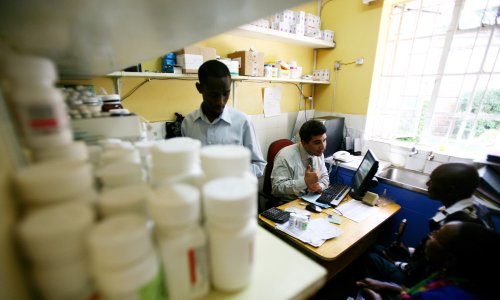The Global Fund and PEPFAR

Photo: Brent Stirton/Getty Images
Available Downloads
Complementary, Successful, and Under Threat
One of the enduring, positive legacies of Presidents George W. Bush and Barack Obama was the establishment and growth of the Global Fund to Fight AIDS, Tuberculosis and Malaria (Global Fund). An independent foundation built to raise and disperse funds to assist poor countries battle three of the world’s deadliest infectious diseases, the Global Fund has leveraged support from the United States and other wealthy countries to save millions of lives. For the United States, the Global Fund has been an integral component of its war on AIDS, alongside its signature bilateral program, the President’s Emergency Plan for AIDS Relief (PEPFAR).
By working closely together, the Global Fund and PEPFAR have supported nearly 20 million people to access life-sustaining antiretroviral treatment, reducing dramatically a runaway infectious killer that was destabilizing communities and imperiling economic growth. Both programs have consistently drawn strong bipartisan praise and support, even in tough budget environments. Yet today, their continued success is imperiled by potential retrenchment of U.S. political and financial support, even as experts report that controlling HIV epidemics is within reach. The administration has requested a more than $1 billion cut to these programs in its FY 2018 budget request to Congress and is also moving to scale back U.S. diplomatic leadership more generally. Budget numbers from the House and Senate look more promising, but without administration support for increases considerable risk remains.
Cuts and reduction in the U.S. footprint threaten the future of the global HIV response and would result in additional lives lost.2 Rather, it is more imperative than ever that the U.S. government maintain strong funding for these programs, increase, not retract, political engagement, and harness the tremendous technical capacity of the U.S. government and its partners to improve the efficiency and effectiveness of country strategies to bring HIV under control.
With different strengths and limitations, the Global Fund and PEPFAR have become complementary and interdependent, and together have yielded substantial results in changing the pandemic’s global trajectory. PEPFAR, as the bilateral arm, allows the United States to engage countries with the highest HIV burdens more directly, harnessing the immense technical capacity of a broad range of U.S. government agencies and nongovernmental and faith-based partners to scale programs rapidly to prevent and treat the disease. By understanding and harnessing the unique strengths of each, the United States can improve their impact and provide an even more compelling case to American taxpayers for continued and even expanded financial support for both.
[1] Todd Summers is a senior adviser to the Global Health Policy Center at the Center for Strategic and International Studies (CSIS). This paper grew out of a CSIS Global Health Policy Center working group on HIV and the work of one of its sub-groups on the Global Fund and its partnership with PEPFAR. The members of the sub-group included the following (organizations listed for identification purposes only): Jennifer Kates, Kaiser Family Foundation; Lisa Carty, UNAIDS; Chris Collins, Friends of the Global Fight; Michael Johnson, Bill and Melinda Gates Foundation; Ambassador (ret.) Jimmy Kolker; Ron MacInnis, Palladium; and John Monahan, Georgetown University. See https://www.csis.org/programs/global-health-policy-center/hivaids/hiv-working-group for a full list of working group and sub-group members.
[2] Kaiser Family Foundation, “What Could U.S. Budget Cuts Mean for Global Health?,” June 13, 2017, http://www.kff.org/global-health-policy/issue-brief/what-could-us-budget-cuts-mean-for-global-health/.
Photo credit: Brent Stirton/Getty Images